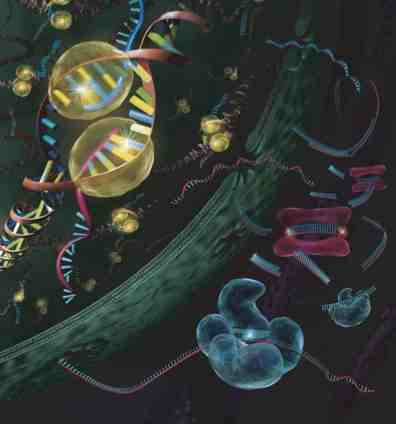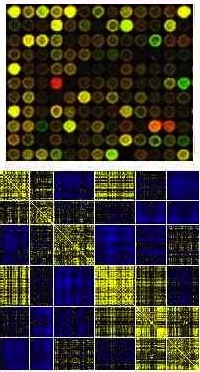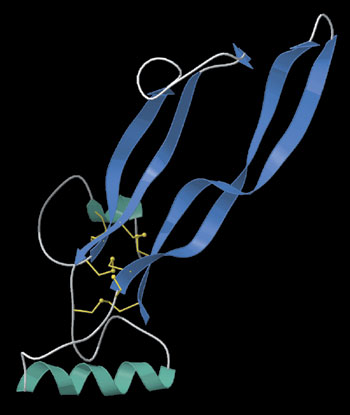 RNA
is implicated in proteins biosynthesis as well as in several
biological processes, which were not even imagined few years ago.
RNA, indeed, is now recognized for its role in protein synthesis
inhibition and for its contribution to genomic complexity:
alternative transcription, splicing and translation and RNA editing
allow single genes to encode for multiple proteins and a
central role for non-coding RNA is beginning to emerge in cell
signaling and regulation of gene expression. For these reasons my
principal research interests and efforts are devoted to the
understanding of Transcriptome complexity, by coupling DNA sequences
annotation and gene expression profiling, supported by robust
statistics and computation.
RNA
is implicated in proteins biosynthesis as well as in several
biological processes, which were not even imagined few years ago.
RNA, indeed, is now recognized for its role in protein synthesis
inhibition and for its contribution to genomic complexity:
alternative transcription, splicing and translation and RNA editing
allow single genes to encode for multiple proteins and a
central role for non-coding RNA is beginning to emerge in cell
signaling and regulation of gene expression. For these reasons my
principal research interests and efforts are devoted to the
understanding of Transcriptome complexity, by coupling DNA sequences
annotation and gene expression profiling, supported by robust
statistics and computation.
 Millions
of cells are dividing every minute in our human body. Normally, this
process is well coordinated and cell divisions are followed by
ordered patterning and cell specialization, allowing the maintenance
of tissues and organs internal equilibrium (homeostasis). Cancer can
be regarded as a deviation from this balanced behavior: a single
cell, that has undergone mutations in its DNA, instead of maturing
and dying normally reproduces without restraint. This is usually
accomplished by incessant rather than faster dividing and it gives
rise to a progeny that usually fails to mature. In this perspective
it is clear that cancer is a very complex disease, involving not
only cancerous cells, but also surrounding and distant normal cells,
which engage an infinite number of complex interactions. Thus the
effort of unraveling such a complexity by using genomic approaches
is among my principal research interests.
Millions
of cells are dividing every minute in our human body. Normally, this
process is well coordinated and cell divisions are followed by
ordered patterning and cell specialization, allowing the maintenance
of tissues and organs internal equilibrium (homeostasis). Cancer can
be regarded as a deviation from this balanced behavior: a single
cell, that has undergone mutations in its DNA, instead of maturing
and dying normally reproduces without restraint. This is usually
accomplished by incessant rather than faster dividing and it gives
rise to a progeny that usually fails to mature. In this perspective
it is clear that cancer is a very complex disease, involving not
only cancerous cells, but also surrounding and distant normal cells,
which engage an infinite number of complex interactions. Thus the
effort of unraveling such a complexity by using genomic approaches
is among my principal research interests.
Gene Expression analysis
 During
my past research experience I had my hands on gene expression
analysis by cDNA microarray and I was responsible for the set up of
the two microarray facilities, which are currently operating at IFOM
(Milan) and at LNCIB (Trieste).
This gave me the chance to follow each step of the procedure, from
clones inoculation in LB medium to data mining, giving me the clear
feeling about the complexity of the technology and boosting in me a
strong interest in statistical and computational approaches to
control data variability and noise. In fact the management and
analysis of the millions of data points resulting from this kind of
experiments requires optimal experimental design and meaningful data
analysis. Last but not least another crucial issue in gene
expression studies is the need of larger samples in order to control
the variability due to inter-individual differences. However, in the
mean time while waiting for more data points, a concrete improvement
is the possibility of performing cross-validation of independent
studies across different laboratories and platform. In this context
I am glad to be part of the GIANT
Working Group
During
my past research experience I had my hands on gene expression
analysis by cDNA microarray and I was responsible for the set up of
the two microarray facilities, which are currently operating at IFOM
(Milan) and at LNCIB (Trieste).
This gave me the chance to follow each step of the procedure, from
clones inoculation in LB medium to data mining, giving me the clear
feeling about the complexity of the technology and boosting in me a
strong interest in statistical and computational approaches to
control data variability and noise. In fact the management and
analysis of the millions of data points resulting from this kind of
experiments requires optimal experimental design and meaningful data
analysis. Last but not least another crucial issue in gene
expression studies is the need of larger samples in order to control
the variability due to inter-individual differences. However, in the
mean time while waiting for more data points, a concrete improvement
is the possibility of performing cross-validation of independent
studies across different laboratories and platform. In this context
I am glad to be part of the GIANT
Working Group
 Systems
biology is the study of living organisms in terms of their
underlying network structure rather than simply their individual
molecular components. In this perspective a "system" can be anything
from a gene regulatory network to a cell, a tissue, or an entire
organism. Unlike molecular biology which focus on molecules, such as
sequence of nucleotide acids and proteins, Systems Biology focus on
systems that are composed of molecular components and try to
understand their underlying dynamics. Systems Biology, for instance,
studies how genes and proteins interact, how fluxes distribute in a
metabolic pathway, or how does a particular system reacts to
external perturbations, trying to identify the mechanisms underlying
the different phenomena and to describe them using suitable
mathematical models. In such an investigation high-throughput
quantitative technologies are essential and must be supported by
robust computational approaches. In the past years genome sequencing
projects and other molecular biology projects accumulated in-depth
knowledge that is now publicly available, so that system-level
analysis can now be grounded at the molecular-level. In this boom of
information a central role can be ascribed to bioinformatics (see
below). Although Systems Biology is still in its infancy, it will
probably become one of the main area in biological sciences in the
near future.
Systems
biology is the study of living organisms in terms of their
underlying network structure rather than simply their individual
molecular components. In this perspective a "system" can be anything
from a gene regulatory network to a cell, a tissue, or an entire
organism. Unlike molecular biology which focus on molecules, such as
sequence of nucleotide acids and proteins, Systems Biology focus on
systems that are composed of molecular components and try to
understand their underlying dynamics. Systems Biology, for instance,
studies how genes and proteins interact, how fluxes distribute in a
metabolic pathway, or how does a particular system reacts to
external perturbations, trying to identify the mechanisms underlying
the different phenomena and to describe them using suitable
mathematical models. In such an investigation high-throughput
quantitative technologies are essential and must be supported by
robust computational approaches. In the past years genome sequencing
projects and other molecular biology projects accumulated in-depth
knowledge that is now publicly available, so that system-level
analysis can now be grounded at the molecular-level. In this boom of
information a central role can be ascribed to bioinformatics (see
below). Although Systems Biology is still in its infancy, it will
probably become one of the main area in biological sciences in the
near future.
 Bioinformatics
can be regarded as the field of intersection between biology and
computer sciences. It uses the power of computer sciences to store,
analyze, integrate and visualize biological data, in order to answer
biologists questions. This field of research is concerned with
organizing biomolecular databases, managing the quality of data
input, getting useful information out of such databases, and
integrating information from disparate sources. Genomics, systems
biology and high-throughput biological research are based on such
sophisticated computer-based tools and improvements in these fields
would not have been impossible without the parallel development of
Bioinformatics.
Bioinformatics
can be regarded as the field of intersection between biology and
computer sciences. It uses the power of computer sciences to store,
analyze, integrate and visualize biological data, in order to answer
biologists questions. This field of research is concerned with
organizing biomolecular databases, managing the quality of data
input, getting useful information out of such databases, and
integrating information from disparate sources. Genomics, systems
biology and high-throughput biological research are based on such
sophisticated computer-based tools and improvements in these fields
would not have been impossible without the parallel development of
Bioinformatics.